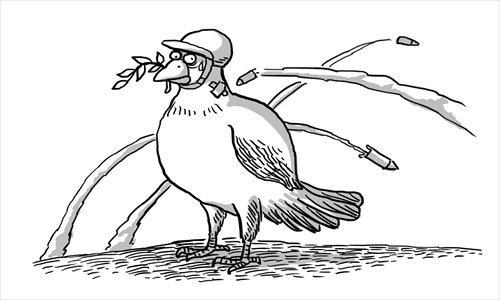Domestic troubles rank higher for Pakistan than India

India and Pakistan are back to their familiar game of mutual hatred. The latest flash point has come over repeated violations of the cease-fire along the Line of Control.
The two adversaries have accused each other of violating the cease-fire, which came into place in 2003. This has been the longest cease-fire in the history of India and Pakistan. Put in place during the tenure of Pakistani General Pervez Musharraf, this is among the few confidence-building measures to last so long despite repeated violations, minor or major.
Pakistan, which is normally way ahead of India in diplomatic britzkrieg, is facing the heat this time because of outrage in India over the January 8 incident where two Indian soldiers were killed and one decapitated.
India retaliated by withdrawing the invitation to Pakistan to attend the Global Business Meet in Agra on January 27, indicating that it is no longer interested in pursuing trade and peace agendas until Pakistan investigates the incident.
The January 8 LoC incident is the worst setback in India-Pakistan relations since the Mumbai terror attacks of November 2008. It has triggered nationwide outrage in India and angry remarks from top Indian government functionaries as well as the main opposition, the BJP.
Indian Prime Minister Manmohan Singh, known for speaking little even on raging controversies, has articulated his government's indignation and cautioned that it will not be "business as usual" with Pakistan until those who mutilated the bodies of Indian soldiers are brought to book.
The strong words from Singh acquire all the more importance because he has virtually single-handedly invested huge political capital into improving relations with Pakistan for the close to nine years since he became prime minister.
The Indian demand is unlikely to be met by Pakistan. This is because the army, the most important institution in Pakistan for the past 65 years, will never allow this concession to the Indians.
Therefore, India-Pakistan relations will remain stuck in the groove for quite some time. The situation is exacerbated by Pakistan's own string of problems, and the civil and military leaders of Pakistan are neck-deep in handling other more immediate crises.
India-Pakistan tensions are not dominating the Pakistani media as much as they are the Indian media. It may be the first time that India-Pakistan tensions have taken a back seat in Pakistani statecraft.
This is partly because the government of Pakistani President Asif Ali Zardari has to tackle more urgent and serious problems which are threatening to eclipse its unprecedented achievement of being the first civilian government of Pakistan that is about to complete a full term.
The region of Balochistan is on the boil, and law and order there is fragile. The Supreme Court has ordered the arrest of Prime Minister Raja Pervaiz Ashraf in a corruption case. Moreover, Pakistan is in the grip of massive public agitations which many commentators have described as "Pakistan's own Arab Spring."
While Pakistan-born Canadian citizen Tahir-ul Qadri has increased the Zardari government's headaches with his "million man march," cricketer-turned-politician Imran Khan has announced his own "tsunami march."
Thus, India does not figure high on Pakistani leaders' radars right now. Yet there are signs of hope. On January 16, the two countries' armies instructed their personnel to respect the cease-fire. Pakistani Foreign Minister Hina Rabbani Khar has softened her tone and offered to hold talks with her Indian counterpart Salman Khurshid to de-escalate the LoC tensions. India is unlikely to accept Khar's offer at this juncture.
India and Pakistan need to stay engaged because one cannot change one's neighbors. They should never give up the route of diplomacy. Talking is the only way forward out of this crisis. Even the US and the Soviet Union never stopped talking to each other in the worst phase of their Cold War.
The author is a New Delhi-based journalist-author and a strategic analyst. bhootnath004@yahoo.com